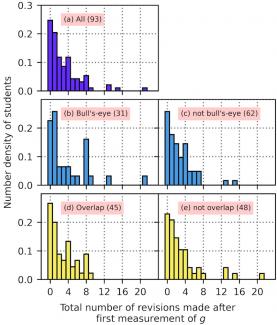Figure 1: Distributions of the number of students as a function of the number of revisions made, normalized by the total number of students, which is given in each legend. In (a) the distribution is for all students in our sample. In (b) and (c) the distributions are for students who either did or did not satisfy the bull’s-eye condition, respectively. Similarly, (d) and (e) correspond to those students satisfying or not the overlap condition, respectively. This measure counts a change even if a student returns to a previous set of parameters. The bull's-eye and overlap conditions are two ways of determining if a student reported a correct answer at the end of their investigation. See Fox 2020 PERC paper for more details.
The Modeling Assessment for Physics Laboratory Experiments (MAPLE) is an assessment that has been developed to measure students' processes of modeling in advanced-level lab classes focusing on either electronics or optics. The assessment consists of two surveys: a pre-test on mechanics (measuring the acceleration due to gravity using a pendulum) and a post-test on either an inverting amplifier circuit or a polarizer setup. In the figure on this page, we show some results from an initial analysis of the pendulum activity showing how students may have used different criteria to determine when their measured value for the acceleration due to gravity was "good enough" for them to stop the process of modeling.



 The Physics Frontiers Centers (PFC) program supports university-based centers and institutes where the collective efforts of a larger group of individuals can enable transformational advances in the most promising research areas. The program is designed to foster major breakthroughs at the intellectual frontiers of physics by providing needed resources such as combinations of talents, skills, disciplines, and/or specialized infrastructure, not usually available to individual investigators or small groups, in an environment in which the collective efforts of the larger group can be shown to be seminal to promoting significant progress in the science and the education of students. PFCs also include creative, substantive activities aimed at enhancing education, broadening participation of traditionally underrepresented groups, and outreach to the scientific community and general public.
The Physics Frontiers Centers (PFC) program supports university-based centers and institutes where the collective efforts of a larger group of individuals can enable transformational advances in the most promising research areas. The program is designed to foster major breakthroughs at the intellectual frontiers of physics by providing needed resources such as combinations of talents, skills, disciplines, and/or specialized infrastructure, not usually available to individual investigators or small groups, in an environment in which the collective efforts of the larger group can be shown to be seminal to promoting significant progress in the science and the education of students. PFCs also include creative, substantive activities aimed at enhancing education, broadening participation of traditionally underrepresented groups, and outreach to the scientific community and general public.